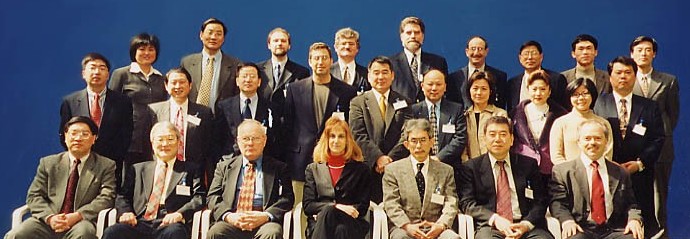“Partnership for Peace: Building Long-term Security Cooperation in Northeast Asia”
The Second Collaborative Workshop on East Asia Regional Security Futures
The Center for American Studies, Fudan University
Shanghai, China, March 3-4, 2001
![]()
![]()
![]()
![]()
On March 3-4, the Nautilus Institute and The Center for American Studies, Fudan University jointly convened their second collaborative research and dialogue workshop on East Asian Regional Security Futures. The research and discussion meeting advanced the ongoing cooperation of the two institutions to promote East Asian regional peace and security, and continues the work of the First Collaborative Workshop, held in Shanghai on May 29-30, 1999.

The meeting brought together a small group of specialists for an open exchange of views on the implications of TMD development and deployment. The agenda of the meeting included brief presentations on the diplomatic, military and technical dimensions of current TMD proposals, and the relationship of TMD to U.S. national missile defense (NMD) proposals. The meeting provided full opportunities for dialog and discussion, comprising both supportive and critical perspectives.
The meeting involved participants from China, Japan, the United States, South Korea, and Russia. Most participants wrote short papers on specific topics concerning the future of the regional security system from the perspectives of the involved countries, and then gave presentations based on these papers. Discussion was aimed to identify the core factors and tensions underlying those issues. A final session sought to generate consensus on those factors and tensions most relevant to the long-term future development of the regional security system. The workshop promoted community-building by enabling an exchange of international perspectives on the critical security issues facing the region.
Specific purposes of this meeting included:
- Provide a forum for discussion of long-term future scenarios for peace and security in Northeast Asia.
- Focus on how building long-term peace and security in the region can be facilitated by reduced reliance as on threats to use nuclear weapons a means of national security.
- Bring together scholars, professionals, and other specialists to foster growth of an international community of experts on long-term regional security issues.
- Facilitate introductions and foster an ongoing network among younger scholars and individuals who will be working on such issues in the future.
- Promote increasing quality of intellectual exchange and mutual understanding on these issues that will extend beyond the meeting and its participants.
This set of web pages provides information on the composition, organization and results of the meeting, including the following items (active links represent information currently available):
- A list of the meeting participants, with links to biographical & contact information
- The meeting agenda
- A summary of the conference discussions
- Links to papers provided by the participants.
- Links to photographs from the conference.
This meeting continues the ongoing work under the Nautilus Institute’s Nuclear Policy Project, which is examining the role of strategic weapons in the long-term evolution of East Asian regional security.
Funding for this meeting was provided by both Fudan University and the Nautilus Institute, under the auspices of projects supported by grants from the Ford Foundation, the MacArthur Foundation, the Ploughshares Fund, and theProspect Hill Foundation.
![]()
![]()
![]()
![]()
![]()

